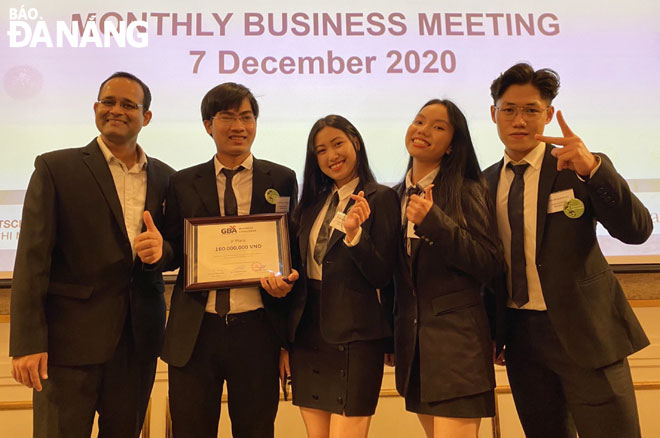Da Nang student brings scientific ideas into fruition
With their deep concern over alarmingly untreated wastewater discharges into the environment made by seafood processing businesses, Nguyen Quoc Vuong, a fourth-year student from the Faculty of Chemistry at the Da Nang University of Technology and Science and his peers has made them standout with their research into aquatic wastewater treatment based on microalgae cultivation technology.
 |
| Nguyen Quoc Vuong (2nd from left) and his colleagues were honoured at the Business Challenge contest |
With its high practical application, Vuong’ brainchild won the first prize worth 160 million VND at the recently-held Business Challenge contest to seek innovative and sustainable ideas from entrepreneurs in Viet Nam. The event was co-hosted by the German Business Association (GBA) in Viet Nam and the German Academic Exchange Service (DAAD) .
Vuong pointed out to the fact that, amidst burgeoning economic development, there are increased global problems facing them such as environmental pollution and the exhaustion of natural resources, all of which are prompting all of us, in their our way, to make something proactive and special to change the world on a positive course.
What really makes the use of algae a thriving technology is that these microorganisms have the potential to efficiently remove nutrients from wastewater, and provide a biomass energy source. Additionally, when combined with the conventional activated sludge systems, the algae-bacteria symbiosis can reduce the electrical energy demands from aeration, which can represent more than 50% of the total energy of wastewater treatment plants.
The positive interactions are clear when microalgae provide, through photosynthesis, the oxygen necessary for aerobic bacteria to biodegrade organic pollutants, consuming in turn the carbon dioxide released from the bacterial activity.
Vuong’s group-conducted research results show that, after cultivating microalgae in aquatic wastewater, the water turns clean and clear, and of special note, it can meet the strict criteria set for treated wastewater allowed to be discharged into the environment.
Moreover, after the treatment processes concludes, algae itself is capable of producing large amounts of biomass, livestock feedstuffs, and especially usable oil in either high rate algal ponds or photobioreactors. This oil can then be turned into biodiesel which could be sold for use in automobiles.
In fact, depending on the nutrient content of the wastewater, up to 1 kg of biomass can be produced per m3 of wastewater processed - this is five times greater than for sludge produced in conventional processes.
Based on his assessments of the great benefits microalgae generates, Vuong came to a remark that, in the near future, when many aquatic plants are built on a large scale, the cultivation of microalgae for wastewater treatment is really necessary as it showcases a dual effect of addressing environmental pollution whilst bringing up more revenue from sales of algae products.
Vuong said he was very lucky to embark upon this outstanding research work as he received useful pieces of advice and constrictive recommendations from PhD Nguyen Thi Thanh Xuan, a lecturer from the Faculty of Chemistry at his university, plus enthusiastic support from his collaborators. They are Nguyen Quang Hoa, Ngo Diem Linh and Pham Huynh Thien An, all of whom are now on academic courses jointly launched by the U.K-based Coventry University and the Da Nang University of Economics.
Vuong said scientific research is only really successful when it is applied into real life and bring highly practical benefits. In his mind, the research group intends to continue to make great efforts to perfecting their brainchild in the time ahead.
By PHAN VINH YEN – Translated by A.T